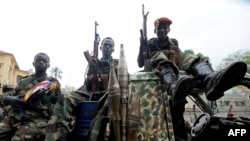France has announced plans to boost its military presence in the Central African Republic to about 1,000 troops in a bid to support efforts to end the escalating unrest in the former French colony.
Foreign Minister Laurent Fabius told reporters Tuesday that France hoped to accomplish several goals during the mission.
"In this operation, what are we aiming for? First, to assist an abominable humanitarian situation, I mean really abominable. Then, restore security in a country that is imploding. Thirdly, allow a political transition, because there are transitional authorities, and fourthly, at some point, allow a kick start of the economy. France is faithful to its mission, which supports Africa and complies with international equality; it will work for peace," said Fabius.
The additional troops would be deployed for about six months. France currently has about 400 soldiers based in the C.A.R.'s capital, Bangui.
Meanwhile, the regional group ECCAS (Economic Community of Central African States) plans to transition its mission in C.A.R. to an African Union-led mission of about 3,600 troops known as MISCA next month.
In mid-December, the African Union will take over the responsibilities of protecting civilians and restoring the central government's authority.
The situation in the Central African Republic has been chaotic since March, when rebels overthrew President Francois Bozize. The transitional government has not been able to control the former rebels or keep Muslim and Christian groups from fighting each other.
Human rights and relief organizations have been expressing growing concern about the unrest.
In a Tuesday statement, Doctors Without Borders said the C.A.R.'s "massive humanitarian crisis" had grown more severe as a result of fighting and threats against civilians.
In an interview with VOA, Amnesty International government relations managing director Adotei Akwei said violence has prompted thousands of people to flee from their homes.
"You have attacks against civilians. You have the gender-based violence against women, the recruitment of child soldiers and you also have the displacement of well over 400,000 people," said Akwei.
The Central African Republic has endured a long series of coups and rebellions since gaining independence from France in 1960.
Foreign Minister Laurent Fabius told reporters Tuesday that France hoped to accomplish several goals during the mission.
"In this operation, what are we aiming for? First, to assist an abominable humanitarian situation, I mean really abominable. Then, restore security in a country that is imploding. Thirdly, allow a political transition, because there are transitional authorities, and fourthly, at some point, allow a kick start of the economy. France is faithful to its mission, which supports Africa and complies with international equality; it will work for peace," said Fabius.
Central African Republic
Central African Republic- Won independence from France in 1960
- Population: Estimated 5.1 million
- Religion: Mix of Christian, Muslim, indigenous beliefs
- Languages: French, Sangho
- Economy largely based on agriculture, mining, logging
- GDP, per capita income among lowest in world
Meanwhile, the regional group ECCAS (Economic Community of Central African States) plans to transition its mission in C.A.R. to an African Union-led mission of about 3,600 troops known as MISCA next month.
In mid-December, the African Union will take over the responsibilities of protecting civilians and restoring the central government's authority.
The situation in the Central African Republic has been chaotic since March, when rebels overthrew President Francois Bozize. The transitional government has not been able to control the former rebels or keep Muslim and Christian groups from fighting each other.
Human rights and relief organizations have been expressing growing concern about the unrest.
In a Tuesday statement, Doctors Without Borders said the C.A.R.'s "massive humanitarian crisis" had grown more severe as a result of fighting and threats against civilians.
Situation in the Central African Republic
Situation in the Central African Republic- Seleka rebel alliance toppled President Francois Bozize in March
- New government cannot control rebel soldiers or country
- Aid groups, U.N. report widespread looting, rapes, lawlessness
- Worries over terrorist infiltration, Christian-Muslim fighting
- U.N. chief Ban warns CAR lacks national authority
- France, African Union to send extra troops
"You have attacks against civilians. You have the gender-based violence against women, the recruitment of child soldiers and you also have the displacement of well over 400,000 people," said Akwei.
The Central African Republic has endured a long series of coups and rebellions since gaining independence from France in 1960.












